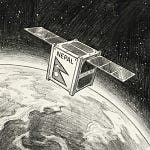Know someone who cares about Nepal? Share this update and invite them to join our growing community of insiders! Subscribe to receive concise insights you won't find anywhere else. 📩 Appreciate your support!
Nepal sees exciting economic shifts 📈 with record-breaking remittance inflows boosting national reserves 💰 and innovative farming practices addressing climate challenges 🌾. However, issues persist ⚠️ with stalled investigations into government accountability and ongoing delays in insurance claim settlements 🕒. From promising pipeline infrastructure 🚧 to bureaucratic bottlenecks 📑, let's dive into the latest developments shaping Nepal! 🇳🇵
Economy & Development 💸
Nepal’s economic outlook is currently facing headwinds, as the health ministry is considering virtual meetings and training due to a freeze in US aid (Kathmandu Post ). The suspension of funding from USAID, following a change in US administration, threatens crucial healthcare programs – including training for doctors and nurses, and potentially impacting outbreak investigations – and raises serious concerns about the long-term impact on Nepal’s public health infrastructure. Officials are bracing for consequences, and the government is reportedly considering a reduction in its healthcare budget, a move that could have far-reaching implications for access to care.
Despite these significant challenges, Nepal is demonstrating resilience and making strides in strengthening its financial position. Foreign exchange reserves have reached a historic high of Rs 2369 billion (My Republica ), sufficient to cover over 17 months of imports. This increase, driven by factors like rising remittance inflows and a growing tourism sector, provides a crucial buffer against external economic shocks. However, realizing the full potential of this financial stability requires strategic investments, particularly in infrastructure. A key long-term project, the Raxaul-Kathmandu railway, is still under evaluation, with Nepal seeking further input from India regarding its feasibility, potential costs, and long-term economic benefits (Kathmandu Post ). With an estimated cost exceeding Rs 400 billion and a projected 25-year payback period, careful planning and transparent financial assessments are essential to ensure the project delivers a positive return on investment.

In other positive economic news, Nepal received Rs 900 billion in remittances during the first seven months of the fiscal year (Onlinekhabar ), underscoring the continued importance of Nepali workers abroad to the national economy. Commercial banks also experienced a modest 1.62% increase in net profits (The Annapurna Express ), though challenges remain with rising non-performing loans. Prime Minister Oli has recently urged the National Planning Commission to prioritize poverty alleviation efforts, acknowledging the need for sustained economic growth to benefit all segments of society. Increasingly, farmers are also adapting to climate change by cultivating lowland crops at higher altitudes, demonstrating innovative approaches to ensuring food security in a changing environment.
Social & Cultural ⭐
Nepal's creative landscape is currently facing scrutiny, as filmmakers condemn recent restrictions imposed by the censor board (Kathmandu Post ). The controversy centers around Deepak Rauniyar’s film ‘Rajagunj’, where the board initially objected to the inclusion of a clip featuring a past statement by Prime Minister Oli. This sparked debate among artists, with many questioning the legitimacy of censorship policies and their impact on artistic expression. Deepak Raj Giri voiced concerns over the board’s composition, claiming individuals without cinematic knowledge are hindering creativity through restrictive decisions.
This situation resonates with broader concerns about the preservation of Nepal’s cultural identity, explored in detail by The Himalayan Times . The article paints a concerning picture of a nation grappling with the erosion of its cultural heritage. From the physical damage to ancient temples and palaces due to natural disasters, to the dominance of Nepali over indigenous languages, Nepal’s unique traditions are under threat. The piece highlights a historical pattern, noting increased censorship after the establishment of the republic – a contrast to the more open period of democracy. It also points out that while Nepal boasts 124 spoken languages, over half the population identifies with a language other than Nepali as their mother tongue, leading to the marginalization and potential extinction of many indigenous tongues.
However, efforts are underway to strengthen cultural resilience. Nepali Times recently reported that 48 A-level students from Nepal received Outstanding Cambridge Learner Awards, highlighting the importance of education in empowering future generations to understand, preserve, and promote Nepal’s rich cultural heritage.
Enjoying this issue? 📩 Share it with a friend & let’s keep Nepalis worldwide in the loop! Got thoughts? Hit reply—we’re all ears!
Politics & Governance 🪧
Nepal's Public Accounts Committee (PAC), responsible for ensuring governmental transparency, has faced sharp criticism for its inactivity, sitting only six times over the past eight months. Opposition lawmakers allege that PAC Chairperson Rishikesh Pokharel deliberately delays meetings to avoid investigating serious financial irregularities related to major projects, such as land acquisition for Gautam Buddha and Pokhara international airports, according to KTM Post. The investigations, involving billions of rupees, have reportedly stalled due to political interference. Lawmakers now threaten to use parliamentary rules to force meetings if Pokharel continues delaying the committee’s essential oversight functions.
Prime Minister KP Sharma Oli has called on the National Planning Commission (NPC) to prioritize poverty alleviation and entrepreneurship, emphasizing that the commission should focus on boosting productivity and self-reliance among Nepalis. Highlighting the importance of effective governance and infrastructure, PM Oli stressed the NPC's role in closely monitoring national pride projects to ensure tangible improvements in public services, as reported by NepalNews. This directive comes as Nepal strives to advance economic self-reliance by enhancing productivity and entrepreneurial ventures, particularly at local levels.
In a significant development, Nepal Oil Corporation (NOC) has begun importing petrol via the Motihari-Amlekhgunj pipeline, significantly cutting transport costs and enhancing fuel supply reliability, according to Republica. The move marks a significant step in reducing transportation costs and ensuring fuel supply security. Meanwhile, addressing persistent delays in insurance claims, the Nepal Insurance Authority (NIA) plans to establish a judicial bench to expedite resolution processes and restore public trust, Republica reports. Over 141 unresolved insurance claims from recent natural disasters underline the urgency of reform, with the new bench expected to streamline disputes, reinforcing accountability in the insurance sector.
Did you know ❓
Nepal's stock market is led by a diverse range of companies, reflecting the nation's evolving economic landscape. As of March 12, 2025, the top ten companies by market capitalization span sectors from finance and insurance to telecommunications and trading. These firms represent a significant portion of Nepal's economic activity and are key indicators of market health. Here’s a snapshot of the top 10 Companies in Nepal by market cap:
Exchange Rate Used: 1 USD = 138.98 NPR (Google Finance, March 15, 2025)
Diaspora & Globalization 🌎
Nepal continues to be significantly impacted by its citizens working abroad, with remittances reaching Rs 900 billion in the first seven months of the current fiscal year – a 7.3% increase year-on-year (Onlinekhabar ). This inflow of funds is vital to the Nepali economy, and is coupled with a rise in the number of Nepalis seeking foreign employment, with over 230,000 receiving final labour approval during the same period. This demonstrates the ongoing reliance on remittances and the continued demand for opportunities outside of Nepal, highlighting the complex relationship between migration and economic stability.
Notably, Japan is emerging as a key destination for Nepali migrants, now hosting the fifth-largest Nepali diaspora globally with over 206,898 residents (Nepali Times ). This surge, largely driven by student visas allowing part-time work, particularly in the Kyushu region, surpasses the growth of the Brazilian community in Japan. Simultaneously, the government is actively seeking international support for the release of Bipin Joshi, a Nepali citizen held hostage by Hamas since October, with Prime Minister Oli appealing to Egypt for assistance (Kathmandu Post ). This underscores the challenges faced by Nepali citizens abroad, and the diplomatic efforts underway to ensure their safety and wellbeing, while also highlighting Nepal’s engagement in international forums like the upcoming Sagarmatha Sambad climate dialogue.
Let’s connect
Loved this issue? Share it with friends and help us keep Nepalis worldwide informed!📩 Share your thoughts! Let us know what you think via our Feedback form or follow us on Facebook | LinkedIn
About Nepali Diaspora Digest:
The Nepali Diaspora Digest connects the global Nepali community with curated news, insights, and stories that matter most. Join us as we celebrate and explore the diverse voices and achievements of Nepalis worldwide.
Partner shout out
belayat.uk: helping Nepalis connect in the UK on jobs, housing, events and finding local nepali owned businesses















